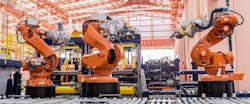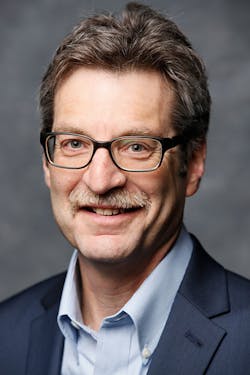Association for Advancing Automation president receives leadership award
Jeff Burnstein, president of the Association for Advancing Automation (A3), is the 2023 Joseph F. Engelberger Robotics Award winner for leadership and will be recognized May 24 in the Grand Ballroom of Detroit’s Huntington Place Convention Center, in conjunction with the Automate Show.
Roberta Nelson Shea, global technical compliance officer, Universal Robots, is the Engelberger application winner for her outstanding work over the course of her career in global robotics safety.
The awards are named after the late Joseph F. Engelberger, known as the founding force behind industrial robotics. Since its inception in 1977, the Engelberger Awards have been given to 136 robotics leaders from around the world for excellence in technology development, application, education and leadership.
The industry leaders were unanimously selected by the awards committee and past chairs of the former Robotic Industries Association (RIA), which merged with the Advancing Vision + Imaging Association (AIA) and the Motion Control & Motor Association (MCMA) in 2021. The resulting association, A3, administers the award, and each winner receives a $5,000 honorarium and commemorative medallion.
Since joining the association in 1983 as manager of marketing and public relations, Burnstein has held a variety of senior positions, culminating in his promotion to president in 2007. Burnstein also serves on the executive board of the International Federation of Robotics (IFR), and he frequently discusses automation issues with policymakers and speaks at global conferences on the impact of automation on jobs and the future of automation beyond the factory floor.
“What a ride!” Burnstein said of his career in automation and the memorable and influential experiences that led him to this award. When he started working in robotics in the early 1980s, the technology was booming, and venture capital was flowing to industry. “Our trade show was growing so rapidly that the fire marshal in Detroit had to restrict the number of people who could attend,” he noted.
Then, led by General Motors canceling a lot of its robotics orders, the robotics industry saw vast consolidation and some companies going out of business. The association and trade show shrunk with the industry. “The robotics industry was pretty much left for dead,” Burnstein said, “except that it wasn’t. It was just going about the business of improving products; enabling technologies, such as machine vision, were also improving; more off-the-shelf solutions were created; and robots became easier to use and less expensive.”
A year after Burnstein took over as president of A3 in 2007, the country sunk into the recession of 2008. The association was fortunate to survive, Burnstein said, and, since then, the robotics industry as a whole has seen tremendous growth, driven in part by China’s emergence as the world’s leading robotics user. “We saw the emergence of collaborative robots, mobile robots and artificial intelligence, which helped robots move beyond automotive and electronics into industries such as consumer goods, food and beverage, warehousing and logistics, medical devices, agriculture and construction,” Burnstein said. “Now, more than 60 years since the first industrial robot was installed at a GM plant, we are on course to fulfill the lofty expectations that existed when I started 40 years ago.”
The pandemic greatly challenged the organization, moving from live events to virtual, and the daily struggles to generate new ideas and revenue sources virtually. “That was an unbelievably challenging time,” Burnstein said. “But we emerged stronger than when we entered COVID, outperforming all of our expectations.” The association is rapidly adding staff to keep up with the new opportunities ahead, Burnstein said. “I see robotics and automation being in the early innings of its growth.”
Robotics enables companies to improve product quality, increase productivity, lower costs, get their products to customers more quickly and increase worker safety, said Burnstein. “All of this helps companies become stronger global competitors,” he emphasized. “From a societal standpoint, robots help make our lives better. Instead of dull, dirty and dangerous jobs that people don’t want to do and shouldn’t be doing, robots help create better, safer and higher-paying jobs. Robots also tackle important challenges such as finding new drugs for rare diseases, creating more abundant and safer food and making our planet more sustainable. I hope that advances in robotics will play a much larger role in elder care.”
Winners of the 2022 Engelberger Robotics Award were Bertil Thorvaldsson, senior advisor for ABB and the father of RobotStudio, for leadership; Bruno Siciliano, professor of control and robotics and director of the Interdepartmental Center for Advances in Robotic Surgery (ICAROS), for education; Melonee Wise, vice president of robotics automation for Zebra Technologies, for technology; Michael Jacobs, founder and CEO of Applied Manufacturing Technologies, for leadership; Oussama Khatib, professor in the Department of Computer Science and director of the robotics lab at Stanford University, for education; and Marc Raibert, founder and chairman of Boston Dynamics, for technology.
A3 has in-depth details on the accomplishments of previous winners.
Control Design spoke with previous winners, including 2017 recipient Dr. Daniella Rus, professor of electrical engineering and computer science and director of the Computer Science and Artificial Intelligence Laboratory (CSAIL) at the Massachusetts Institute of Technology (MIT) and 2015 honoree Raffaello D’Andrea, one of the founders of Kiva Systems, which was purchased by Amazon in 2012, and professor of dynamic systems and control at the Swiss Federal Institute of Technology (ETH) in Zurich.
The 2023 awards dinner will be held May 24 from 5:15 p.m. to 8:30 p.m. in the Grand Ballroom at the Huntington Place Convention Center in Detroit. Tickets for the event, which include the cocktail reception and dinner, may be purchased when registering for the Automate 2023 Show and Conference, May 22-25.
About the Author
Anna Townshend
Managing Editor
Anna Townshend has been a writer and journalist for 20 years. Previously, she was the editor of Marina Dock Age and International Dredging Review, until she joined Endeavor Business Media in June 2020. She is the managing editor of Control Design and Plant Services.

Leaders relevant to this article:


